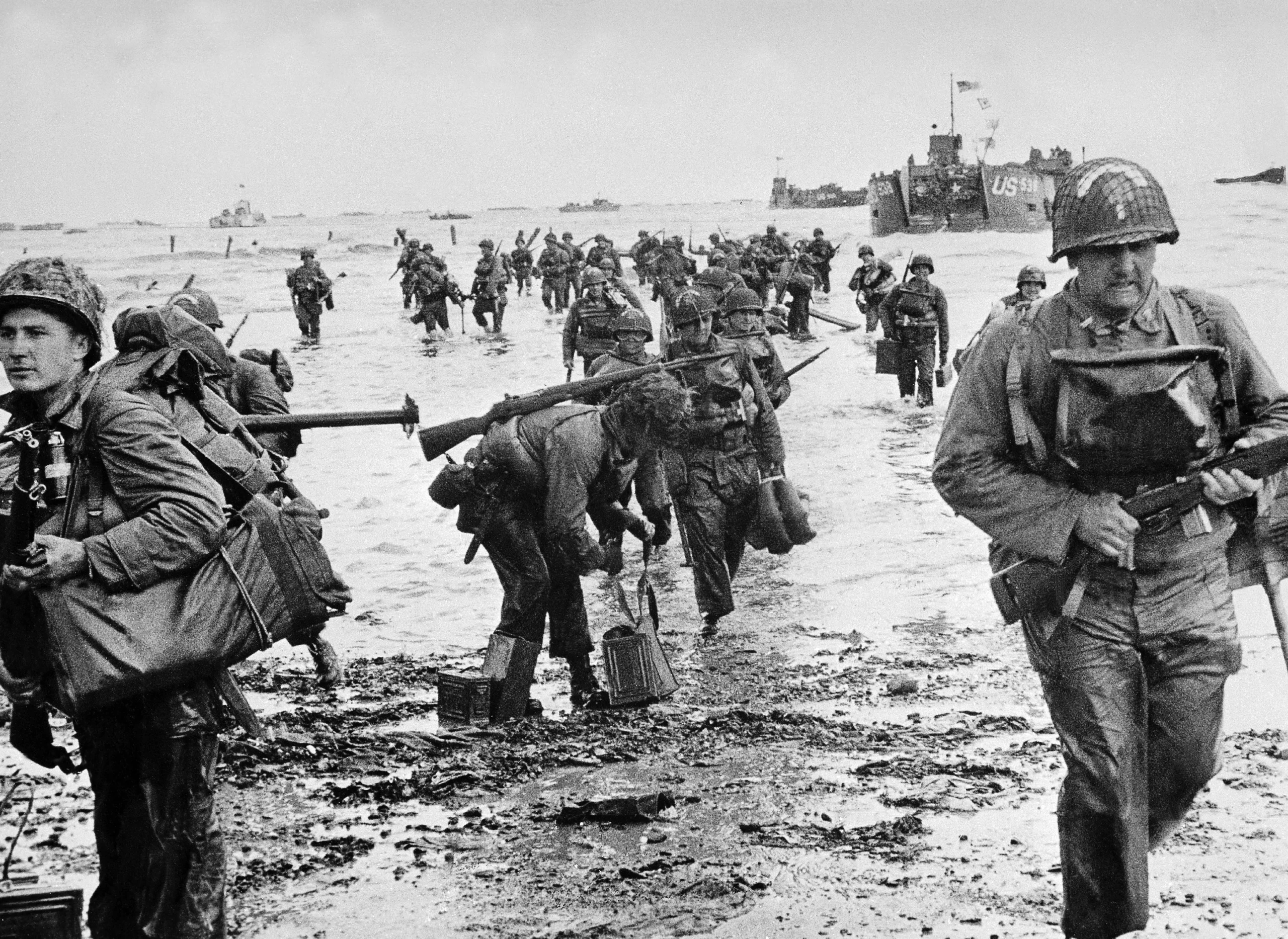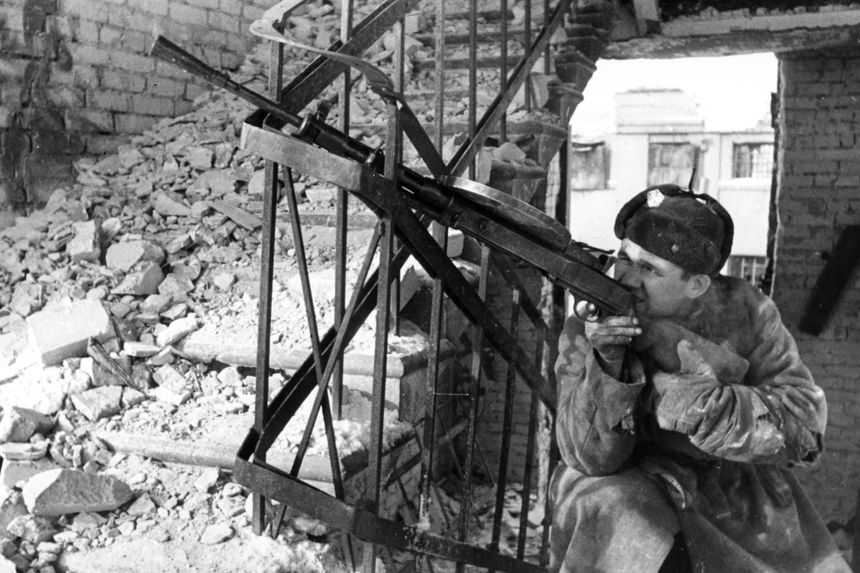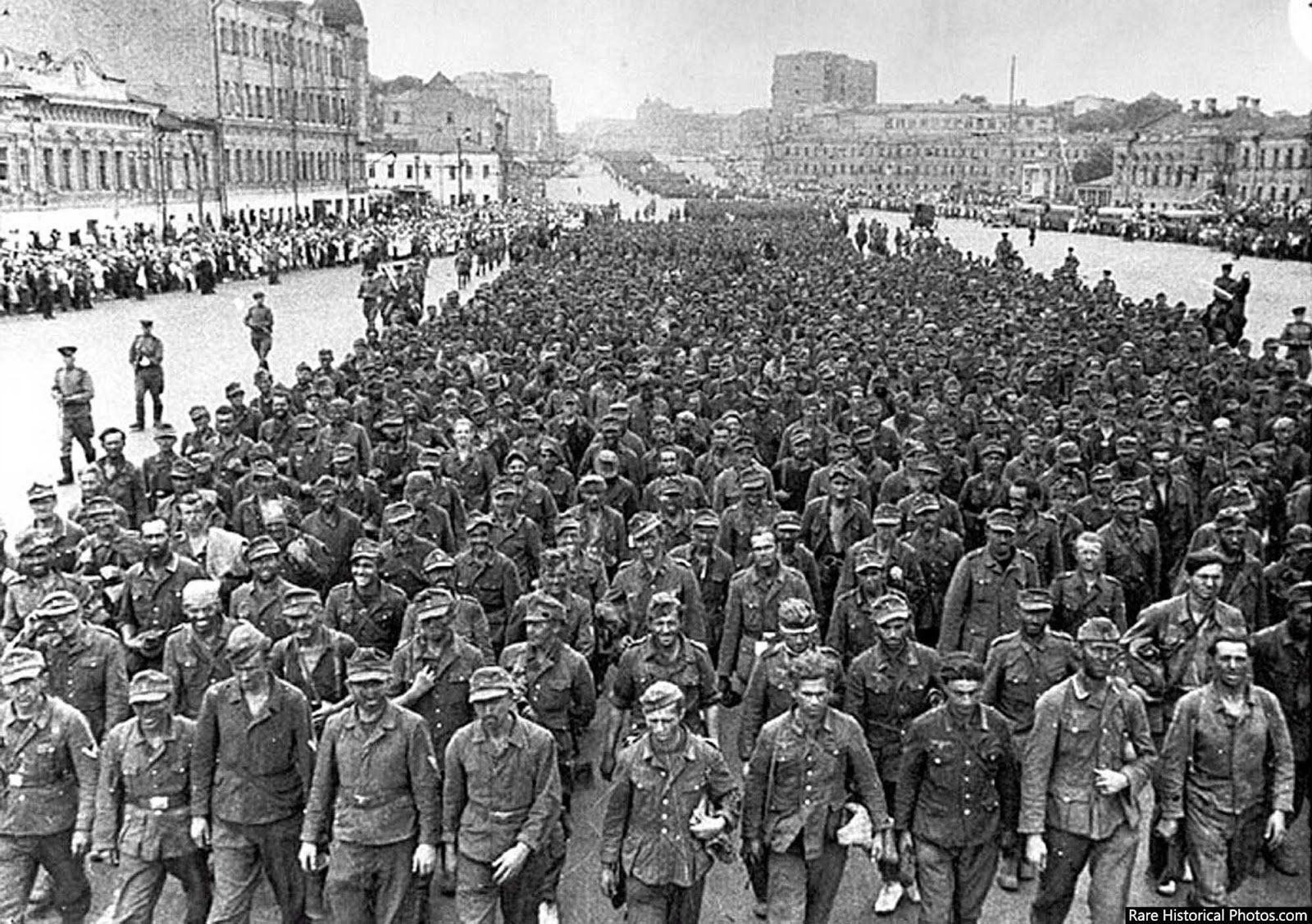THE BATTLE OF STALINGRAD 1942-1943: HISTORICAL CONTEXT AND IMPORTANCE

 Jacques Pauwels
Jacques Pauwels

1942: After aerial bombardment has almost totally cleared their path into the city of Stalingrad, German troops make their way through the ruined suburbs. Almost every standing building in Stalingrad served as a firing point for Germans or Soviets, forcing house-to-house combat. (Photo by Keystone/Getty Images)
However, to win the great war planned by Hitler, Germany, a highly industrialized country but lacking colonies and therefore woefully short of strategic raw materials, had to win it fast, before the depletion of the stockpiles of imported rubber and above all petroleum that Germany could establish before the start of the conflict. These reserves, much of which consisted of imports from the US, could not be adequately replenished by synthetic fuel and rubber produced at home (on the basis of coal) and/or oil supplied by friendly or neutral countries such as Romania and – after the Hitler-Stalin Pact of August 1939 – the Soviet Union. It is in this context that the Nazis developed the strategy of Blitzkrieg, “lightning warfare”: synchronized attacks by massive numbers of tanks, airplanes, and trucks (for transporting infantry), piercing the defensive lines behind which the bulk of the enemy’s forces were typically ensconced in the style of World War I, then encircling these forces, leaving them to face either annihilation or capitulation.
In the meantime, the Red Army had recuperated from the blows it had received initially, and on December 5, 1941, it launched a devastating counter-offensive in front of Moscow. The the Nazi forces were thrown back and had to adopt defensive positions. With great difficulty, they would manage to arrest the Red Army’s offensive and survive the winter of 1941-1942. In any event, on the evening of that fateful fifth of December, 1941, the generals of the Wehrmacht’s high command reported to Hitler that, on account of the failure of the Blitzkrieg strategy, Germany could no longer hope to win the war. The Battle of Moscow heralded the failure of the lightning-war strategy against the Soviet Union. From a Blitzsieg, a “lightning-like victory,” on the eastern front, in 1941, Nazi Germany’s political and military authorities had expected that it would have made a German defeat in the entire war impossible, and that would almost certainly have been the case. It is probably fair to say that if Nazi Germany had defeated the Soviet Union in 1941, Germany would today still be the hegemon of Europe, and possibly of the Middle East and North Africa as well. However, in front of Moscow, in December 1941, Nazi Germany suffered the defeat that made an overall German victory impossible, not only victory against the Soviet Union itself, but also victory against Great Britain and victory in the war in general. In other words, December 5, 1941, was the real turning point of the Second World War. It ought to be noted that at that point –a few days before Pearl Harbor – the United States was not yet involved in the war against Germany. In fact, the US only became involved in that war because of the Battle of Moscow.3

Claus von Stauffenberg. Wanted to get rid of Hitler and sue for an "honorable peace" with the allies, but the plot failed.
In any event, the impact of the Battle of Stalingrad was enormous. In Germany, the public was henceforth painfully aware that their country was heading towards an ignominious defeat, and countless people who had previously supported the Nazi regime now turned against it, Many if not most of the military and civilian leaders who were involved in the attempt on Hitler’s life in July 1944, for example, lionized today as heroes and martyrs of the German “anti-Nazi resistance,” such as Stauffenberg and Goerdeler, may have been brave individuals, but they had enthusiastically supported Hitler at the time of his triumphs, that is, before the defeat at Stalingrad.
If, after the Battle of Stalingrad, they wanted to get rid of Hitler, it was because they feared that he would drag them with him into ruin. Awareness of the significance of the German defeat on the banks of the Volga similarly demoralized the allies of Nazi Germany and caused them to start looking for ways to exit the war. As for the neutral countries, many of which had hitherto sympathized with Nazi Germany, mostly because their rulers shared Hitler’s anti-Sovietism, they became considerably more benevolent towards the members of the “anti-Hitler coalition,” and above all towards the “Anglo-Americans.” Franco, for example, pretended not to notice the allied airmen whose planes had been shot down over occupied countries and who, assisted by resistance fighters, crossed the Pyrenees from France into Spain to return that way to England.
In France and in other occupied countries, the leading political, military, but also economic collaborators, that is, bankers and industrialists, started to discreetly distance themselves from the Germans. Relying on the benevolent services of the Vatican and the Franco regime, they sought contact with the Americans and the British, from whom they received sympathy and assistance as both sides were eager to preserve the established capitalist social-economic order. (The French historian Annie Lacroix-Riz has focused on this little-known aspect of the war in a couple of her thoroughly researched and documented books.) Conversely, the news from Stalingrad boosted the morale of Germany’s enemies everywhere. After many long years of darkness, when it had seemed that Nazi Germany would dominate all of Europe forever, resistance fighters in France and elsewhere finally perceived the proverbial light at the end of the tunnel. And their ranks were now increasingly reinforced by many who had been too lethargic before they received the happy tidings from Stalingrad. In France, in particular, the name of Stalingrad became a battle cry of the resistance. After the great victory of the Red Army on the banks of the Volga, the specter of an inevitable defeat haunted 6 Germany, while in the occupied countries everybody knew that the hour of liberation approached– slowly, perhaps, but surely.
Let us know consider the post-Stalingrad situation from the viewpoint of Uncle Sam and his British (junior) partner. There is no doubt about it: the prospect of Germany being defeated and of France and the rest of Europe being liberated by the Red Army caused alarm bells to ring in the halls of power in London and Washington. The Western Allies had been happy to remain on the sidelines, minimizing their losses and maximizing their military strength, while the Nazis and Soviets were locked in mortal combat on the Eastern Front. While the Red Army provided the cannon fodder needed to vanquish Germany, they would be able to intervene decisively, like a deus ex machina, whenever the Nazi enemy as well as the unloved Soviet ally would be exhausted. With Britain on its side as a junior partner, the USA would then be able to play the leading role in the camp of the victors and dictate the terms of the peace to the Soviets as well as the Germans. It is for this reason that, in 1942, Washington and London had refused to open a “second front” by landing troops in France. Instead, they had implemented a “southern” strategy by sending an army to North Africa in November 1942 to occupy the French colonies located there. Because of the outcome of the Battle of Stalingrad, the situation had changed dramatically.

Despite the Hollywood hoopla, the D-Day landings had a far less noble purpose than what Anglo-American media, politicians, and historians would admit.
However, when the news of the Soviet triumph at Stalingrad became known and its implications started to sink in, which was in early 1943, it was too late to plan a landing in France for that same year, so things had to wait until the spring of 1944.
As the Second World War came to an end, and for quite a few years afterward, most denizens of Western European countries victimized by Nazi Germany, but France in particular, were keenly aware that the libération of their homeland was above all due to the efforts and sacrifices of the Soviet Union, a fact that had become evident a the time of the Red Army’sglorious victory in the Battle of Stalingrad. It was a period of time when these same people, in stark contrast to the present situation, harboured enormous gratitude and goodwill vis-à-vis the Russians and other ethnic groups – Ukrainians, Georgians, Armenians, Azeris, Uzbeks, etc. – of the Soviet Union. The name given in June 1945 to one of the largest squares in Paris still recalls that distant and brief moment in time: Place de la Bataille-de-Stalingrad, ‘Square of the Battle of Stalingrad.
(Sources are available on request) 9
Print this article
The views expressed herein are solely those of the author and may or may not reflect those of The Greanville Post. However, we do think they are important enough to be transmitted to a wider audience.

Unfortunately, most people take this site for granted.
DONATIONS HAVE ALMOST DRIED UP…
PLEASE send what you can today!
JUST USE THE BUTTON BELOW
Did you sign up yet for our FREE bulletin? This work is licensed under a Creative Commons Attribution-NonCommercial 4.0 International License ALL CAPTIONS AND PULL QUOTES BY THE EDITORS NOT THE AUTHORS |


